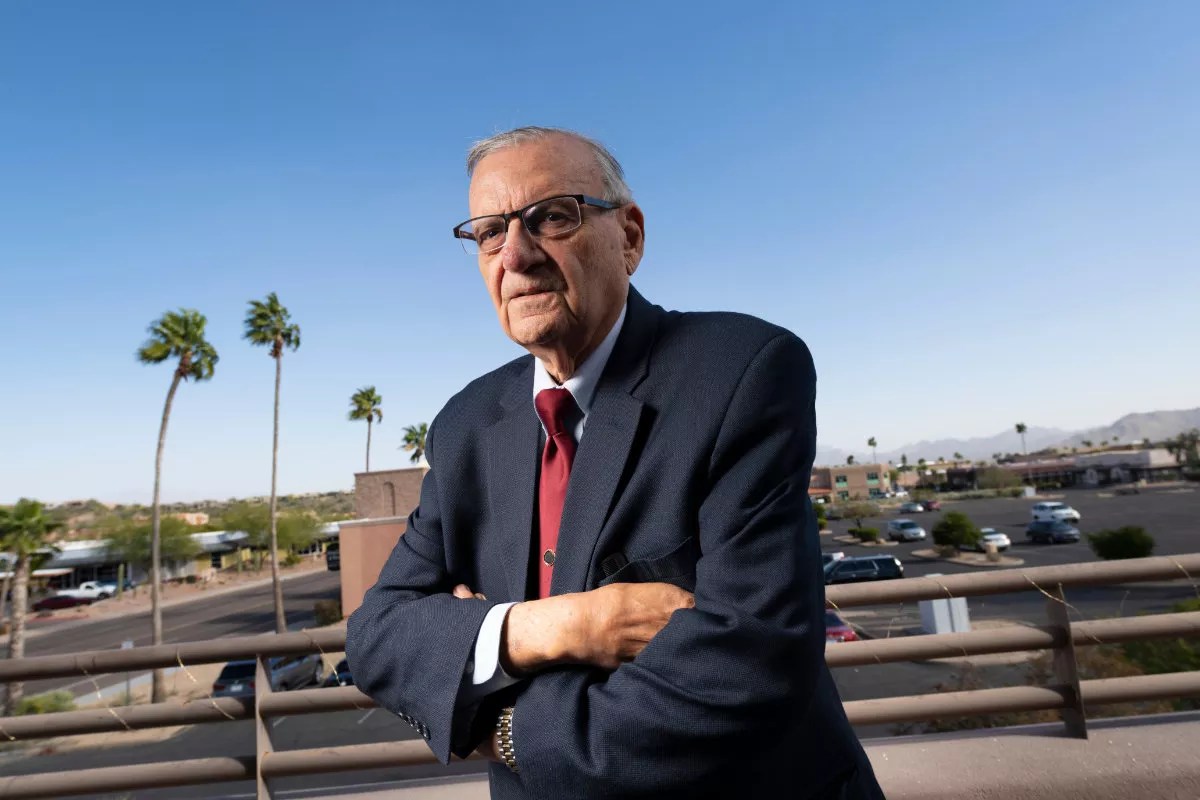
Pablo Robles

Audio By Carbonatix
Joe Arpaio never really went away. He’s back, trying to cling to power. He wants to do it his way, and his way doesn’t sit well with a lot of people. If you didn’t like him behind a sheriff’s desk, you really won’t like him in a mayor’s chair.
But to his fans, the kind of people who would drop the average weekly living wage in Phoenix on a lo-res photo of the man’s birthday cake, it’s not a recurring nightmare, but a dream come true.
Arpaio, candidate for Fountain Hills mayor, switched off the engine to his cherry red Cadillac DeVille and shuffled out of the arid late June heat and into the local community center to celebrate a milestone birthday, his 90th.
Maricopa County’s long-time former sheriff didn’t open presents that night, the night he was flanked by 250 of what he called “celebrities and fans.”
He insisted the bash was not a fundraising event, but that didn’t stop him from charging partygoers $45 a pop to get in the door. Once inside, attendees didn’t think twice about purchasing Inkjet-printed photos of Arpaio’s birthday cake for $741.40, plus tax and shipping.

For the sensible price of 1.70 plus tax, you too can become the proud owner of an acrylic print of Joe Arpaio’s 90th birthday cake, featuring the titular line from his favorite song: My Way.
Screenshot
None of that money appeared on Arpaio’s most recent campaign finance reports.
And yet, every speaker, from Congressional candidate Mark DeLuzio to state senate firebrand Wendy Rogers, was a Republican politician who spoke exclusively and glowingly about Arpaio’s mayoral bid. None shared personal anecdotes or reflections, as friends would at any other b-day bash.
But Arpaio didn’t really care about that. Four days before the party, he had already opened the only gift that really mattered to him, a letter mailed from West Palm Beach, Florida. He used a mahogany-handled paper knife to get to the prize inside.
Arpaio and his supporters still refer to him as Sheriff Joe, six years after voters threw him out of office. So does the author of the letter, which Arpaio read quietly during a recent interview, seated at the stately desk inside his campaign office on Palisades Boulevard.
“On behalf of the citizens of Maricopa County, you are a true legend,” he read in a near-whisper. His lips curled into a faint smile.
The typed letter is signed President Donald J. Trump in dark ink.
Arpaio picked up the phone to wish Trump the same. The two have bragged about sharing a birthday with each other and Flag Day, June 14.
No answer.
As festivities wound down, Arpaio made a point to tell everyone about the letter at his birthday party while Frank Sinatra crooned over the loudspeaker. Then it was time for Sinatra’s “My Way,” Arpaio’s favorite song.
Trump’s, too.
“Donald Trump stole that from me when I talked to him about it on a plane,” Arpaio told New Times in one of several hours-long interviews between early February and late July. On Tuesday, Fountain Hills voters will cast their ballots for or against the polarizing former Maricopa County bigwig.
This small-town election is Arpaio’s Alamo. His last, desperate chance to regain power.
If successful, his last political gig will likely resemble his longest, if Arpaio and more than two dozen people who know him well are to be believed. They all paint the same picture, with many of the same hallmarks: money, power, patronage, revenge, cult of personality, hero worship, blind loyalty, fearmongering, and looseness with the facts.
He’s not riding into the sunset just yet. And he’s not shy about admitting his final wish is to get even with his political enemies and to go out on top.
Arpaio is like a predator in a cage that’s way too small. Always in motion. Hungry. He flashes back to when he was king of Arizona’s conservative political jungle. His influence has waned, but the predatory instincts that made him widely reviled are as sharp as ever.
The thought that he might not die in office keeps him up at night. And he knows it takes a lot of cash, a few true-hearted acolytes, and a sprinkling of mistruths to make his dream come true and avoid a personal nightmare.

Former Maricopa County Sheriff Joe Arpaio.
Pablo Robles
Bromance Brewing
Arpaio’s lengthy reign as sheriff is checkered with civil and human rights violations. He sank hundreds of millions of taxpayer dollars into civil lawsuits that tanked his career, and was later convicted of criminal contempt in 2017 after disobeying a federal judge’s order to stop racial profiling, which he still calls a “witch hunt.”
Money and policy changes were awarded to Arpaio’s victims in three federal court cases in Phoenix, Puente v. Arpaio, Ortega-Melendres v. Arpaio, and U.S. v. Maricopa County, in which Arpaio was a named defendant, between 2013 and 2017.
His personal legal entanglements are all behind him now, thanks to an unsolicited presidential pardon from Trump. With a clean slate, Arpaio spent this year desperately campaigning not to lose his fourth-straight election.
He invited Trump to his Fountain Hills birthday party. Trump declined. But the ex-president did fly into Phoenix Sky Harbor International Airport in late July for a rally in Prescott.
“You’re very popular, Joe,” Trump said at the July 22 rally to deafening applause. “Weren’t those the nice days? You had Sheriff Joe, and you had no problems with illegal immigrants pouring into your living room. What they did to him was a disgrace. He’s a hell of a man. You remember the pink tents, the pink underwear, the pink everything. Everything was immaculate, it was clean.”
Trump was alluding to the infamous seven-acre “Tent City Jail” in Phoenix that helped make Arpaio a household name. Inmates at the now-defunct jail, which some critics dubbed a “concentration camp,” ate scanty meals of only peanut butter and bread and donned pink underwear, socks, and flip-flops.
The jail closed immediately after voters first booted Arpaio from office in 2016. He now sells pink boxer briefs (made in Pakistan, by the way) in an upscale Fountain Hills shop for $25 a pair. He’ll even slap an autograph on them.
In 2007, during Arpaio’s heyday, illegal immigration in the U.S. soared to its highest numbers ever at the time. From 1996 to 2015, the suicide rate among jail deaths in Arpaio’s lockups was an astounding 24 percent, with 39 of the 157 hanging themselves.
“The whole thing was like something out of a third-world dictatorship,” Phoenix-based veteran political New Times columnist Stephen Lemons said in an interview. “He wanted to turn the Sheriff’s Office into a mini version of ICE, terrorizing entire cities. It was a sickening, sickening time.”
In 2008, New Times reported that, under Arpaio’s authority, and maybe at his direction, “the intake holding cells are extremely dirty, and the sinks and toilets unsanitary and inoperable.”
“Trump ruined my reputation when he said I ran a clean system,” Arpaio told New Times just after the rally, belly laughing.
Tent City bore hallmarks of Trump’s ignominious separation and arrest of immigrant families at the U.S.-Mexico border in 2018. Conditions at these border detention facilities led some in Congress to come up with the “kids in cages” label.
Trump introduced himself to Arpaio in 2015 and asked if he’d emcee a campaign rally in Phoenix for his budding presidential bid. Arpaio obliged.
“I looked him in the eye and I said, ‘You’re going to be our next president,'” Arpaio recalled. “I just had a gut feeling.”
Arpaio said he was the “honorary chairman” for three presidents: George W. Bush, Mitt Romney, and Rick Perry. Only Bush actually got to the White House, but Arpaio did run the campaigns for all three in the Grand Canyon State.
Trump was different, though, Arpaio said. That’s not just because he’s the only man from whom Arpaio would accept a “golden shower” and “amazing blowjob,” as he admitted during a 2018 episode of Sacha Baron Cohen’s Showtime series Who Is America?
In 2019, an 87-year-old Arpaio said he decided for the first time in his life who his hero was: Trump.
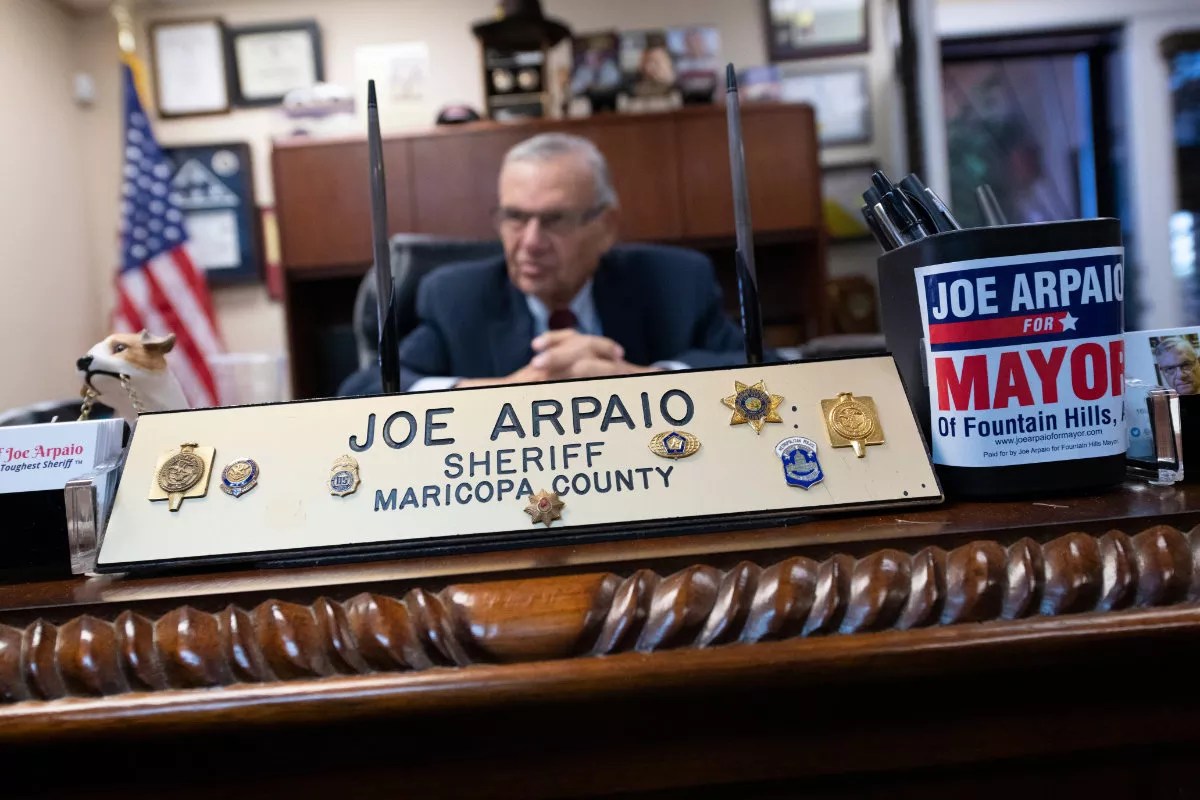
Former Maricopa County Sheriff Joe Arpaio.
Pablo Robles
It took Trump’s pardon in federal court for Arpaio to reach that conclusion. Arpaio didn’t ask for the pardon or even know it was coming, he said. Veteran Arizona Republic reporter Michael Kiefer, who covered Arpaio extensively while he was sheriff, remembered that Arpaio “thought it was a joke. He thought somebody was pranking him.”
Arpaio still welcomed the pardon warmly, adding that he thought it absolved him of guilt.
“It was probably going down in history as one of the big [sic] hit jobs there is,” he said. “What they did to me, they could do against anyone. Sometimes, criminal justice isn’t really justice.”
Poetic, isn’t it? More echoes of his hero.
“The Trump pardon will never erase the decades of abuse and constitutional violations against the people of Maricopa County.” — Victoria Lopez, director of program and strategy at the ACLU of Arizona
The American Civil Liberties Union spearheaded numerous civil lawsuits against Arpaio, the longest-serving sheriff in American history. The ACLU blamed Arpaio for what its lawyers called some of the most egregious violations of civil and human rights in the history of Arizona – from racial profiling to horrific jail conditions and violating the First Amendment rights of journalists.
“The Trump pardon will never erase the decades of abuse and constitutional violations against the people of Maricopa County,” Victoria Lopez, director of program and strategy at the ACLU of Arizona, told New Times. “Arpaio’s alignment with Trump further shows how out of touch he is with the needs of most Arizonans.”
Indeed, it’s doubtful the average Fountain Hills voter prioritizes handing the mayor more power. But that’s exactly what Arpaio has in mind as his first order of business.
With a little help from his friend, Trump.
“I want to elevate the role of the mayor,” Arpaio said. “My friend, the president, the former president, talks about governors, talks about congressmen, you name it. We’ve got to start talking more about mayors.”
Arpaio’s grasps at various local, state, and federal offices are best explained by his intentions to grab power, not serve constituents, activists agree.
“Time and time again, Joe Arpaio has shown that he is not interested in serving the people, but his own political interests,” Lopez said. “He does not understand or respect the Constitution or the obligations that come with holding public office.”
A Dish Best Served Cold
In 2016, Maricopa County voters elected Democrat Paul Penzone to replace Arpaio as sheriff for the first time since he took office in 1992.
Fountain Hills is one of a few small towns in the Valley that doesn’t have its own police department, instead contracting with the Maricopa County Sheriff’s Office for police services. The mayor could snuff that arrangement quickly with the support of three council members.
Arpaio seeks to “still have authority in law enforcement” and this is the easiest way to do it, he said.
“If I’m the mayor and [Penzone] is the Sheriff, and I said I want this done, he says no, you’re fired,” Arpaio said. “Then I’ll go and get another police department. The people should know the mayor still has authority, and I do. The irony is that the elected sheriff works for me.”
The other irony is that the overwhelmingly Latino and Native American community of Guadalupe also mulled firing the MCSO after Arpaio ordered routine immigration sweeps there, but the small town couldn’t afford to set up its own police department.
Fountain Hills might. And Arpaio has a friend or two in town already.
Fountain Hills Town Councilman David Spelich denigrated Penzone at a May meeting, describing him as “galling” and saying he was “leaving a bad taste in my mouth” and “adding insult to injury” by negotiating up costs.
Penzone told New Times he “will not be providing a comment.” He did not elaborate.
Arpaio claims that half of this year’s $22 million town budget in Fountain Hills goes to the county sheriff’s office. It’s actually less than a quarter, at a little over $5 million. The town’s budget is slated to more than double by 2023.
“I have a lot of guns and badges. Also, I might bring back the posse in my own way.” — Joe Arpaio
Arpaio didn’t share what he’d do with the extra money if he nixed the agreement.
“People like that with power wait for an opportunity to spring their revenge,” Lemons said.
For Arpaio, who claims “Steve Lemons made a career out of me,” that opportunity is now.
“I can hire, and I can fire,” he said. “I have a lot of guns and badges. Also, I might bring back the posse in my own way.”
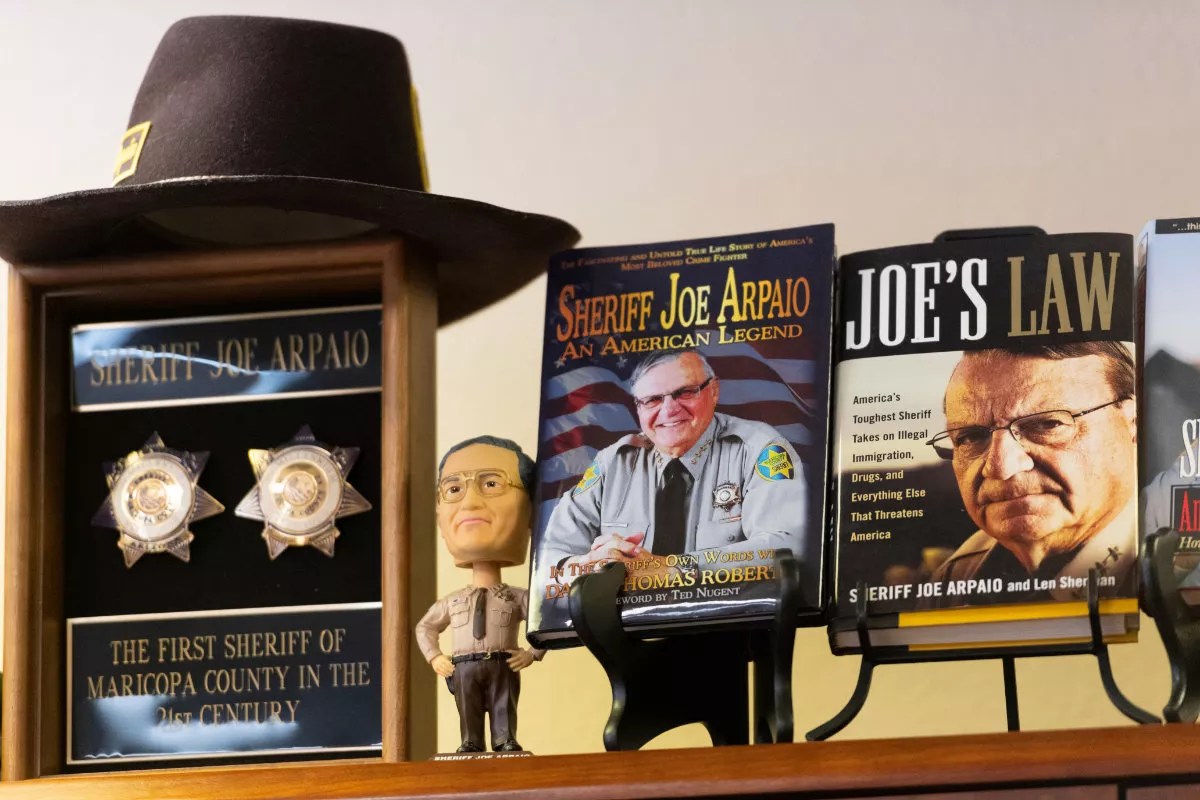
Memorabilia in the office of former Maricopa County Sheriff Joe Arpaio.
Pablo Robles
Saddle Up the Posse
The posse was Arpaio’s corps of 3,000 untrained volunteers who bore arms and departmental insignia, drove marked cars, carried guns, and were given wide latitude to make arrests. Shortly after assuming office, Penzone launched an investigation into the posse and drastically restructured it, after a court ruled the arrests violated the law.
Now, Arpaio said he wants to resurrect the posse in Fountain Hills, to the dismay of his critics.
“This is part of his legacy: abuse of power to target people who dare to stand up to him,” Lopez said. “This is a chapter from a tired playbook that does nothing to advance the lives of Arizonans.”
Another play in the playbook: keep the groupies close and spurn anyone who doesn’t deliver.
Before his 2018 bid for U.S. Senate, in which he turned up dead last in a pool of three in the Republican primary, Arpaio fired Chad Willems, his campaign manager of 20 years.
Finance records show Arpaio paid Summit Consulting Group, where Willems is a managing partner, $94,019 in late June.
Arpaio’s new quasi-campaign managers, Carlo Oddo and Kevin “The Roaster” Decuyper (a nickname Arpaio came up with in reference to Decuyper’s acid tongue online), represent a stark departure from the law-and-order and experience-centric platform on which he’s running. Together, they’re widely known in Arpaio’s orbit as “the goons.”
It’s a ragtag and bobtail new posse, so to speak, working to help Arpaio get revenge. Records show each goon was paid $1,000 monthly for “consulting services” between October 2021 to July 2022.
Oddo, 50, is a former Good Charlotte tour manager dubbed a “rip-off artist” in a 2004 Rolling Stone article. The company he owned, 97 Radio, shut down after scamming artists out of thousands of dollars, the magazine reported.
Oddo was charged with assault and pleaded guilty to lesser disorderly conduct and fighting charges in Surprise Municipal Court in 2020, records show. He pleaded guilty to other misdemeanor charges in Fountain Hills Municipal Court late last year.
Oddo’s grandfather was a member of Arpaio’s original posse in the 1990s. That was his foot in the door. For Arpaio, loyalty is everything.
“When I first moved to Arizona [in 2018], I didn’t like the guy much based on what I saw on the news,” Oddo told New Times. “We’re really close now. I love the guy and what he stands for.”
“We’re in a tough position with the Blacks.” – Joe Arpaio
Decuyper, 26, described himself as a neo-Nazi on his personal Facebook account, which was deleted after New Times reached out to him. He was impeached from the Arizona State University conservative club College Republicans United in 2019 for promoting ethno-nationalist views.
“I work in state politics and co-founded a right-wing organization that’s already called Nazis/alt-right,” he said in leaked social media chats published in 2019 by New Times.
Decuyper erupted in applause amid a crowd of hundreds in Orlando, Florida, in February when Arpaio took the stage at the America First Political Action Conference and told the crowd that he was often called the “biggest racist in the country.”
Arpaio told New Times in a recorded interview, “he was afraid I was going to ask him a question,” he said.
“I got detained by some of Joe’s thugs,” Watkiss told New Times. “Joe had a bullshit dog-and-pony show for himself. The knuckle-dragging inner posse that worked for the sheriff corralled us in a little room and locked the goddamned door.”
‹

Left Center RightResize
Crop359 x 538✖i›
- Pablo Robles
- Former Maricopa County Sheriff Joe Arpaio.
“We’re in a tough position with the Blacks,” Arpaio said in a recorded interview, adding he was a good candidate for Fountain Hills mayor because “I used to go lock up illegals in this town.”
As Lemons, the political columnist put it, “He’s one of the most successful politicians in Arizona history. Unfortunately, it’s for all the wrong reasons.”
No Such Thing As Bad Publicity
Few people understand that better than journalists.
Arpaio, the self-styled “America’s Toughest Sheriff,” doled out a $3.75 million settlement in 2013 to New Times co-founders Michael Lacey and Jim Larkin, whose false arrests in 2007 were orchestrated by Arpaio.
Plainclothes cops in unmarked cars with Mexican license plates took Lacey and Larkin from their homes in the middle of the night after the editors published Arpaio’s home address, a public record. The address was published in a story about Arpaio’s commercial real estate empire, questioning how a county sheriff could amass so much cash to invest in property and why records of the transactions were hidden from public view.
“There was no check on Arpaio’s authority. He arrested whoever he wanted to,” Lemons said. “People were afraid. It’s a dangerous situation, especially when someone is as vindictive as Arpaio is. He’s living proof that the good die young.”
Arpaio’s feud with Lacey and Larkin is the tip of the iceberg.
“He was afraid I was going to ask him a question. The knuckle-dragging inner posse that worked for the sheriff corralled us in a little room and locked the goddamned door.” – Mike Watkiss, veteran investigative reporter.
Mike Watkiss, a veteran investigative crime reporter at Phoenix’s KTVK Channel 3, who cameoed as an ace reporter in the 1994 screwball comedy hit movie Dumb and Dumber, was tossed from a public press conference in 2015 because “he was afraid I was going to ask him a question,” he said.
“I got detained by some of Joe’s thugs,” Watkiss told New Times. “Joe had a bullshit dog-and-pony show for himself. The knuckle-dragging inner posse that worked for the sheriff corralled us in a little room and locked the goddamned door.”
Watkiss demanded to be arrested or let go, and he was released. A memo that surfaced in a 2013 Maricopa County Sheriff’s Office investigation revealed Watkiss was the only person on Arpaio’s “no-fly list,” which barred journalists from press conferences.
Kiefer, the Republic reporter, was tailed while writing about how Arpaio’s crony, then-Maricopa County Attorney Andrew Thomas, threatened bodily harm against the county’s longtime presiding criminal court judge, Gary Donahoe. Thomas brought unfounded and malicious criminal charges against him and three other judges.
That led the Arizona Supreme Court to disbar Thomas. Arpaio recently called Donahoe a “corrupt George Soros puppet.”
Arpaio’s ire turned to the press who covered the dispute.
“I was being followed around. It felt like the mafia,” said Kiefer, one of two journalists present when Arpaio received the news of his presidential pardon at his Fountain Hills home. “There would be a white pickup truck following me home. If I was having a drink, people who looked particularly cop-like stood next to me, initiating conversation and being weird.”
At one time, Kiefer watched over his Republic colleague’s shoulder as her mouse cursor moved by itself, opening and closing documents, he said.
Still, he sent Arpaio condolences when his wife of 63 years, Ava, died suddenly last year.
“Despite the abominable things he does, he’s a lot of fun,” Kiefer said. “He’s a likable guy.”
Arpaio’s demeanor kept him in the media’s good graces and allowed him to chase the press spotlight, which he did famously. He has meticulously clipped every newspaper article mentioning his name “since I was born,” he said, and keeps the collection in his Fountain Hills campaign headquarters.
“When I go to the toilet, I make the news,” he said, adding, “I enjoy reading Phoenix New Times on the toilet, but that has nothing to do with the contents.”
He says New Times is his favorite newspaper, despite more than 20 years of documenting his abuse of power and other failings. That hasn’t soured his opinion of the publication, he claims.
A New York Times reporter recently asked Arpaio why he likes negative publicity and mentioned New Times.
Arpaio responded, “Why not? That’s how I get my name in the paper.”
That’s Rich!
The efficacy of Arpaio’s mayoral campaign hinges on two keys: name recognition and money.
According to annual campaign finance reports filed with the Arizona Secretary of State in January, Arpaio’s receipts were 100 times that of his competition, Mayor Ginny Dickey.
Already by then, a year before the small local race, Dickey raised $2,128 for her campaign, while Arpaio amassed $206,414, the most money raised by a mayoral candidate in Fountain Hills history. By far.
Not one penny came from an Arizona voter.
Arpaio’s campaign raised $238,588, according to finance reports filed last month. Dickey had earned a little over $35,000.
“The current mayor doesn’t like me, big time. She is on the other side of the fence, the liberal Democrat side,” Arpaio said. “If they get dirty on me, I fight back. I’ve got the money. I’ve got the name ID, not just here, everywhere.”
Arpaio banked on support from GOP voters, but that has dwindled since he left the sheriff’s office.
In increasingly greater numbers, Republicans disavow Arpaio’s practices when he wore that six-pointed golden badge. They didn’t nominate him in the primary for a U.S. Senate seat, after all.
“If you give him a modicum of power, bad things will happen,” said a local political consultant to prominent elected Arizona Republicans who is familiar with Arpaio. “You cannot be a decent human being and not be incredibly disgusted with the things he did. He is an embarrassment to Arizona, and he is an embarrassment to the Republican Party.”
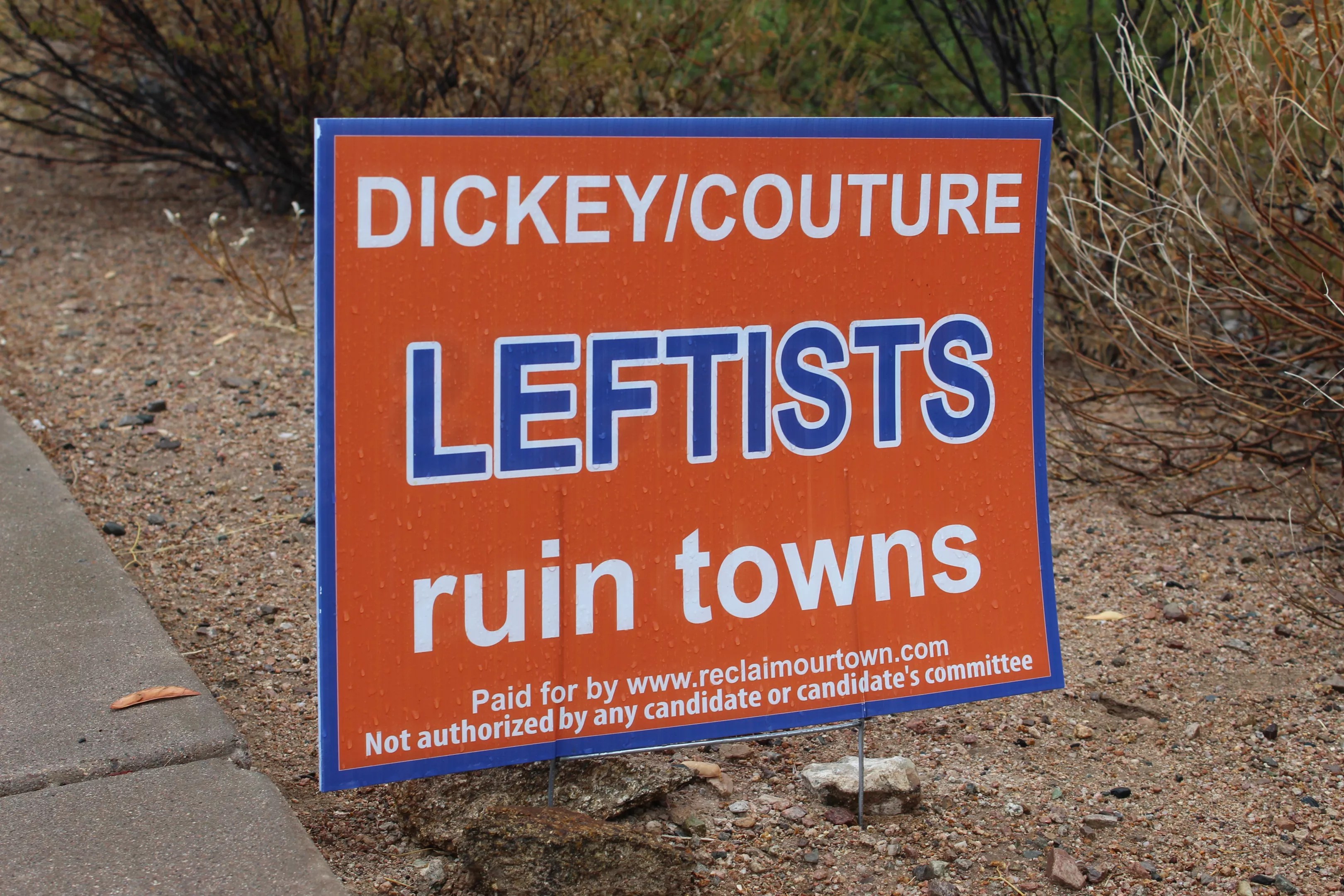
Supporters of former Maricopa County Sheriff Joe Arpaio accuse incumbent “leftist” Mayor Ginny Dickey of ruining Fountain Hills, the small, affluent Phoenix suburb that Arpaio has called home for 20 years.
Elias Weiss
Fundraising is hardly a novel concept for Arpaio, whose losing campaigns in 2016, 2018, and 2020 totaled more than $16 million in receipts. In each comeback attempt, Arpaio lost the vote in Fountain Hills.
He didn’t have much monetary support there. Only nine of 153 first-quarter donors live anywhere in Arizona. Arpaio’s final campaign finance report filed in July reveals just over $17,000 of his total coffers came from Fountain Hills voters.
It’s the same strategy that bombed in the past. In his 2018 Senate bid, most of Arpaio’s cash came from flurries of small donations from California.
When Arpaio was first unseated in 2016, Penzone got the job with less than 8 percent of the money Arpaio spent.
Penzone famously received a $2 million contribution from liberal billionaire George Soros. Nicole and Timothy Bidwill – both children of late Arizona Cardinals owner Bill Bidwill who both still work with the team – also contributed, as did former Arizona Diamondbacks and Phoenix Suns executive Rich Dozer.
Arpaio blamed professional sports in Phoenix for toppling his campaign.
“They [local sports franchises] didn’t want me back because I’m too controversial, bad for the reputation of Arizona,” Arpaio said. “Maybe they should win a championship instead of selling the team’s gear.”
People In Glass Houses …
Between the pink boxers and his online memorabilia store, Arpaio doesn’t seem to have qualms with selling gear.
He wants to bring law and order back to what he claims is a crime-stricken Fountain Hills. That’s despite the town being dubbed one of the two safest communities in Maricopa County in 2019. In the FBI’s most recent Uniform Crime Report for Arizona, from the same year, the bureau reported it was not aware of a single felony offense in Fountain Hills.
“I am a little afraid about Fountain Hills. You still got illegals, and the biggest problem, all the drugs,” Arpaio said. “We have drugs in this town. Plenty of it.”
Crime reports from the Maricopa County Sheriff’s Office tell a different story – one of a very safe, affluent town with nary an immigration or drug arrest to be found.
Neither the word “drugs” nor “immigration,” nor any variant of either word, appears in the Maricopa County Sheriff’s Office’s most recent annual crime report for Fountain Hills.
“Those issues are not usually in the purview of being a mayor, especially because we’re not a border town,” Dickey, the 38-year Fountain Hills politician, told New Times. “He has said some other things about crime that just aren’t bearing out. We’re a very safe community and have been all along.”
In 2008, the progressive Dickey was one of the first to call out Arpaio’s racial profiling. Her campaign is centered around developing social programs and low-income housing in Fountain Hills.
Arpaio played hooky from a June 28 debate with Dickey, electing to accept an award from an Italian club in Las Vegas instead. He is the son of Italian immigrants and was adamantly pro-immigration at one time before his existential pivot on the subject.
Arpaio also claims Fountain Hills is not business-friendly, citing a town ordinance that limits the size and number of signs businesses are allowed to post.
In reality, despite the coronavirus pandemic, business is booming in town, including the recent additions of new residential developments and even a tea room opened by Arpaio’s own daughter, Sherry Boas.
“The idea that we are somehow not encouraging businesses is dispelled by the partnerships and activities over the last several years,” Dickey said.
Arpaio claimed that a winning bid would make him the oldest first-time mayor in American history. That claim is also untrue.
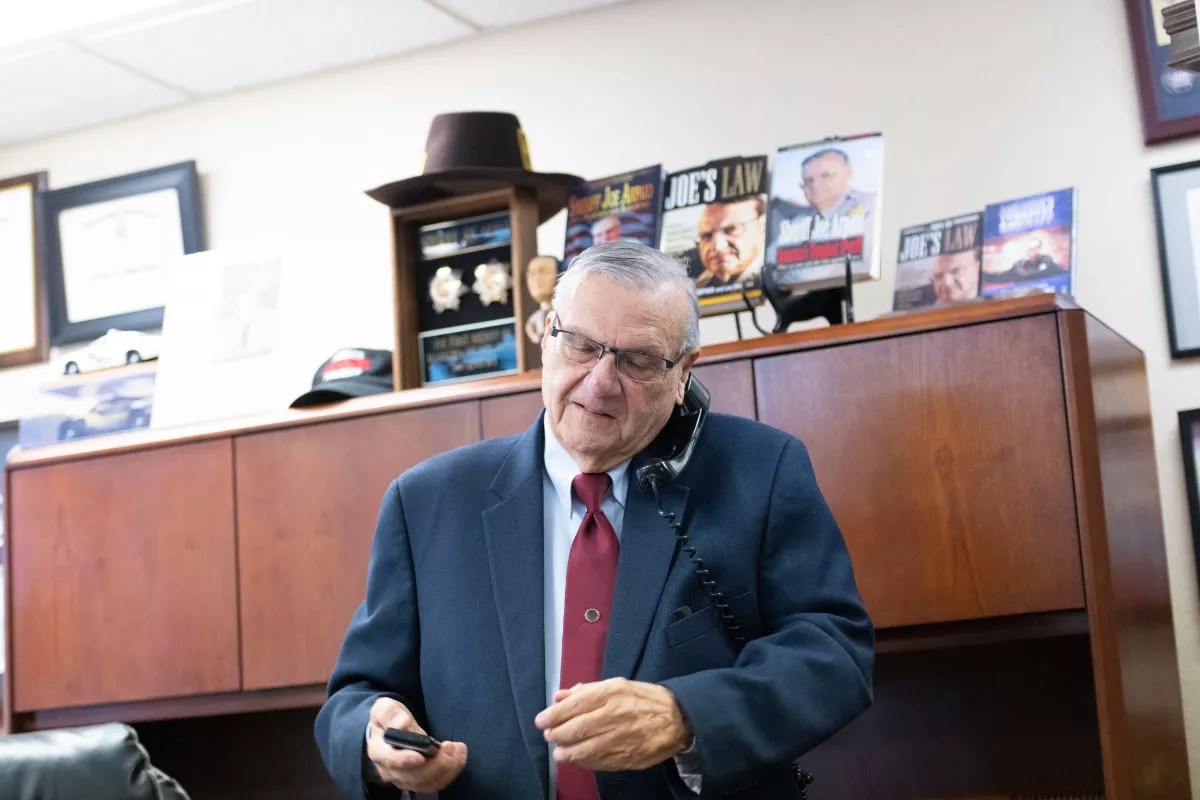
Former Maricopa County Sheriff Joe Arpaio.
Pablo Robles
I Did It My Way
Arpaio was in a sour mood on July 8.
Election Day was fast approaching, and a vandal had defaced his favorite Fountain Hills landmark, Fountain Park, where the town’s iconic 560-foot fountain stands. It was once the tallest in the world.
Hot pink construction paper signs littered the park with messages like, “Arpaio has a ‘pee-pee’ tape,” “Ginny Dickey isn’t a seditious traitor like Joe Arpaio,” and “Joe Arpaio will turn Fountain Hills into a desert prison.”
Arpaio called the signs “disgusting graffiti” and promised $2,000 from the campaign chest to anyone who could help lead to the arrest and conviction of the perpetrators.
“The current mayor should immediately launch an investigation regarding this type of activity, realizing history shows on occasion violent behavior follows [sic],” he said.
After all, he has always been a lawman.
Arpaio’s earliest childhood memory dates back to 1940, when at age 8 he dressed up as a dual pistol-wielding constable of the Old West and frolicked in Connecticut tobacco fields. Arizona beckoned.
He sums up his leadership style with this vapid sort of haiku: “Never give up. Hate procrastination. Hate the word ‘can’t.'”
It’s a mantra he lives by, though.
“I may go to 102, and if I do, I’ll still be working. “I’ll work until I die.” – Joe Arpaio
“I may go to 102, and if I do, I’ll still be working,” Arpaio said. “I’ll work until I die.”
The swagger and charisma that spellbound so many for so long have dulled with age. But the 90-year-old Arpaio still zips up and down the stairs, goes on long walks around the lake, and drives his cherry red DeVille around Fountain Hills. The Cadillac, bearing Arizona veteran plates, just rolled over 6,000 miles.
Arpaio credits his good health to never smoking marijuana or tobacco, with the exception of “a couple of times” in which he puffed cigars, but only undercover and “posing as the mob” as part of a Drug Enforcement Agency sting.
He has his gaffes now. In interviews, he let slip that “a taco represents a woman’s uterus,” and “people from foreign countries often do work giving handjobs.” In fact, all the way back in 2010, New Times joked that dementia was already setting in.
At times, Arpaio refers to his late wife in the present and even the future tense. He’ll snap back to reality and hastily change the subject.
His only remaining hobby is watching movies, his favorite being the 1980 romantic drama Somewhere in Time. He never watches the same movie twice. Recreational time is better spent working, he says. And career always comes before family. Always.
It all comes back to his (and Trump’s) favorite song, Sinatra’s “My Way.”
“Regrets, I’ve had a few. But then again too few to mention,” the big band legend sang on his 1969 track.
Another lyric that resonates in Arpaio’s mind.
“I made a few mistakes in my life, but I don’t apologize for locking up all these people. Because I’d do it again,” Arpaio said. “I did nothing wrong, and if I did do something wrong, it was in good faith.”
We asked Arpaio, “What’s a secret you’ve never told any reporter before?”
He responded, “That I am actually a nice guy.”
More than 100,000 members on the “People Against Sheriff Joe Arpaio” Facebook page couldn’t agree less.
Love him, hate him, or ignore him, Arpaio said he wants a lyric from the song engraved on his tombstone, to epitomize his 24-year tenure as Maricopa County sheriff: “I faced it all, and I stood tall. And did it my way.”
It’s a metaphor for his life now, he said. The song opens, “And now the end is here.”
Metaphorically. Politically, he’s still up to his old tricks.